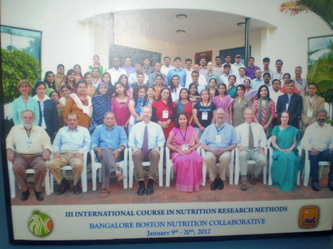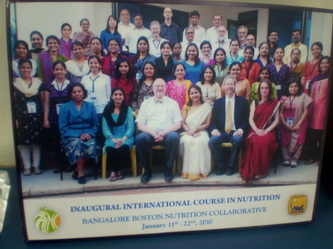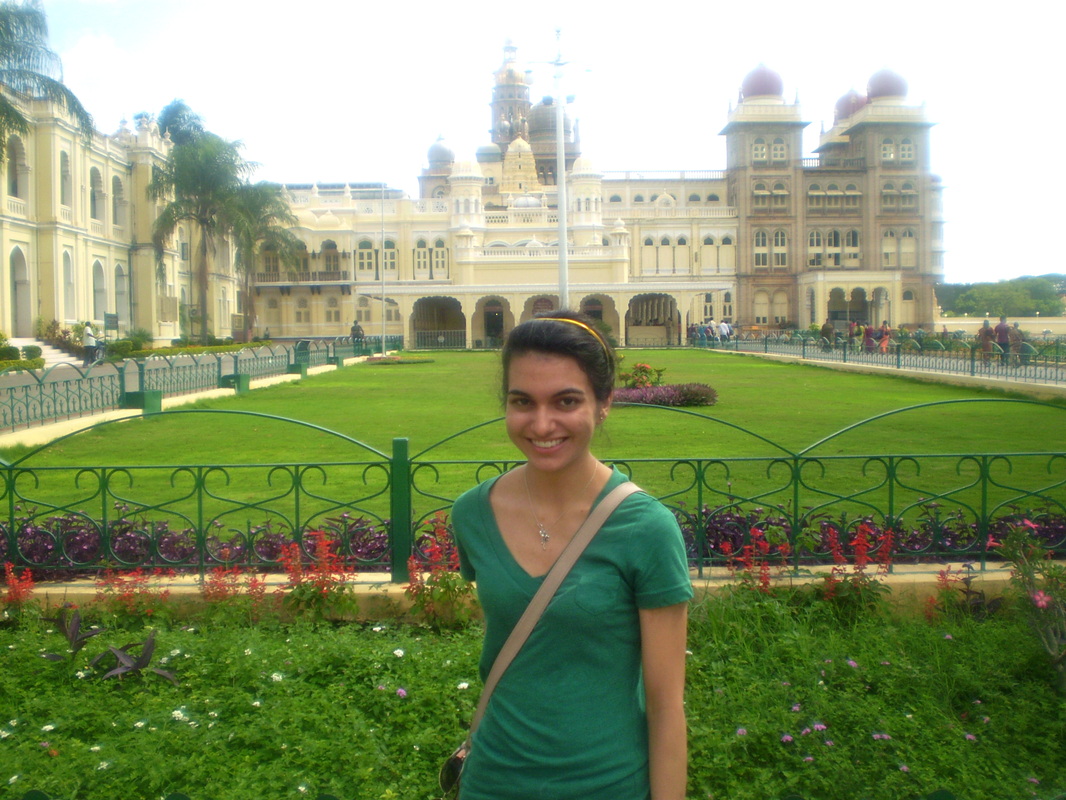Week 3: Interview with Dr. Rebecca RajAssociate Professor, St. John's Research Institute at St. John's National Academy of Health Sciences in Bangalore, India by Shaira Bhanji 1. Describe your role at St. John’s National Academy of Health Sciences. I have three faculty positions: one in the medical college, one in the research institute, and the other in the hospital. At the medical college, I am an Associate Professor in the Nutrition Division, where I teach classes. At the research institute, I focus on nutrition research, and in the hospital, I head the Clinical Nutrition Unit. In addition, I oversee the cafeteria at the institute. 2. What does your current research involve? What do you love most about your research? Mainly, my research in pediatric obesity—finding out the determinants and risk factors of it. Being a nutritionist, I understand that childhood is the most important phase for growing. I also do a lot of body composition and energy expenditure studies of both adults and children. 3. Have you lived in India your whole life? Yes. All my schooling was in Chennai, Tamil Nadu and then in Bangalore, Karnataka. 4. How did you get to where you are today? I did my college degree in nutrition, and then I did an M.Phil (Masters of Philosophy) in nutrition. After that, I joined St. John’s Research Institute (SJRI) for research. Since I was involved in the medical college, I felt the need to do a doctorate degree. I was involved in a lot of research, so combined my research with my doctorate degree. 5. What made you fall in love with science and research? In India, the system is very different from the U.S., where you can jump fields between undergraduate and graduate degrees. All along, I knew I wanted to be in nutrition. I had done my Ph.D. in nutrition and was very certain I didn’t want to do food service management afterwards. So that left teaching in an academic institution or research. I chose the field of clinical nutrition after joining SJRI. I was lucky that at the same time, clinical nutrition was needed in the hospital. We do a lot of pediatric clinics with children who have metabolic and other disorders and help the mothers plan their diets accordingly. I started out with the clinical nutrition unit, and because this unit is good at research, the rest came naturally. One of the initial studies I was involved in, was to determine amino acid requirements. The amino acid requirements, which we developed here, have become the World Health Organization (WHO) standard. I’ve been in clinical nutrition for a long time, and I’m lucky that I have the best of both worlds—research and the clinical side. I like interacting with people, and ultimately I like whatever research we do to be translated to the people it affects. 6. What do you like least, or what would you change? There are a lot of places where getting permission to conduct research tasks such as going into schools (to measure body composition, etc.) is very difficult. But I feel like it’s all worth it if you foster interpersonal relationships and give back to the community you are trying to affect. 7. Do you think it’s different to do research in India vs. elsewhere? Sure. In some places in India, one could do mediocre research and get published, while in others, the country is up to international standards. Research here is also difficult, because there’s a lot of bureaucracy in India. So, getting the education department, etc. involves a lot of red tape. Additionally, there are economic constraints to complicate the mix. 8. What is it like to be a female researcher? Have you come upon any obstacles? I’ve been at SJRI for 18 years and have been given a lot of opportunities. It’s been a situation where you’re put in a pond and asked to swim. But when you swim well, all credit is given to you. I’ve been fortunate not to have any negative experiences as a woman, but I’m sure they do exist outside the institute and my experience. 9. What do you think is the biggest public health problem in India that till needs attention? Especially in children, nutrition is the biggest. While not a public health issue per say, poverty is a big one as well. You can talk about nutrition a lot—both over- and under-nutrition. But when poverty is the main problem, sometimes advice is not helpful. In our country, there is a dual burden of disease. Lack of awareness and education are big problems as well—not just in nutrition. 10. Describe a day in your life Oh, it’s a mad day! The initial two hours (9-11AM) are spent catching up with official mail, writing manuscripts and grants, meeting my team members, going to the study site if needed, and checking in with the cafeteria. Afterwards, around 11AM-1PM, I am at the clinic providing nutrition counseling. In the afternoon, it is back to academic work. The evening is spent with students or training my team of nutritionists. My day ends at about 5:30-5:45PM. 11. What advice do you have for aspiring female scientists? I think the only way I survived doing so many things is my ability to multitask. If you want a mix (research, clinical and academic), it’s all about multitasking and time management. These two traits are very important, at least to my job. Otherwise it’s impossible—either at work or at home, you will suffer. About the Blogger
0 Comments
Your comment will be posted after it is approved.
Leave a Reply. |
The Lab JournalWelcome to the summer internship series of 2012! Follow 9 Scientista bloggers through their summer internships to catch a glimpse of what it is like to be a scientista^TM. By Title- India Presents: A "New World Symphony"
- Through The Lens: The Intricacies Of Diabetes - Do Nanoparticles Glow? - Using Unusual Animals to Study Human Disease - Using the Hubble Telescope - You Think What You Eat - Experimenting With the Life of a Scientist(a) - 18.085: My Summer at MIT - Science Heals: A Summer of Global Health Research By BloggerRabeea Ahmed
Riana Balahadia Shaira Bhanji Nzuekoh Nchinda Amy Beth Prager Natalie Punt Juliet Snyder Pin-Wen Wang Stephanie Wang Archives |
The Scientista Foundation, Inc. All Rights Reserved © 2011-2021 | Based in NY | [email protected]
The Network for Pre-Professional Women in Science and Engineering
The Scientista Foundation is a registered 501(c)(3) -- Donate!
The Network for Pre-Professional Women in Science and Engineering
The Scientista Foundation is a registered 501(c)(3) -- Donate!




 RSS Feed
RSS Feed